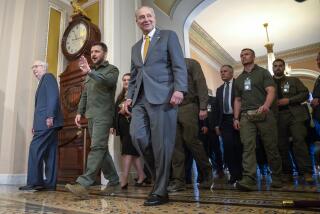U.S. to Pressure Sides at Kosovo Peace Talks
- Share via
RAMBOUILLET, France — With peace talks on Kosovo going nowhere after a sterile, frustrating week, Secretary of State Madeleine Albright flew in from Washington on Saturday night to warn Serbs and ethnic Albanians: Compromise or face the consequences.
“If the Serbs are the cause of the breakdown, we’re determined to go forward with the NATO decision to carry out airstrikes,” said Albright’s spokesman, James P. Rubin.
At the White House, President Clinton announced that he wants to dispatch nearly 4,000 U.S. troops to be part of a NATO enforcement mission in Kosovo if the Serbian and ethnic Albanian negotiators ensconced in a chateau here since Feb. 6 can reach genuine agreement.
“The time to stop the war is right now,” Clinton said in his weekly radio address. “It is increasingly clear that this effort can only succeed if it includes a NATO-led peace implementation force that gives both sides the confidence to lay down their arms.
“It’s also clear that, if there is a real peace, American participation in the force can provide such confidence, particularly for Kosovo’s Albanians.”
The United States and five European powers have granted the warring sides no more than two weeks to agree to a compromise to quench violence in Kosovo, the Balkans’ newest flash point with at least 2,000 dead.
The Serbian delegation is demanding that the ethnic Albanians join in signing a formal 10-point declaration of principles that includes keeping the disputed province a component of Serbia, the main republic of what remains of Yugoslavia. The Kosovo Albanians, whose ultimate goal is independence, refuse. Western officials accuse the Serbs of stalling.
“At this point, we are having very, very, very, very serious difficulties with the Serb party,” NATO Secretary-General Javier Solana told reporters during a visit to Canada.
The Serbs, for their part, blame the ethnic Albanians for the lack of progress or complain about being locked up in the “bastille” of Rambouillet’s opulent 14th century chateau.
“Why should we have a war with the international community?” Serbian President Milan Milutinovic asked a Paris news conference on Friday. “We are in conflict with the terrorists.”
He meant the Kosovo Liberation Army guerrillas, who are fighting for an independent Kosovo.
After the closed-door negotiations opened, the parties were handed a 60-page plan approved by the United States and five European powers that would grant ethnic Albanians, who make up 90% of Kosovo’s 2 million people, much greater power of self-rule.
However, under the three-year interim accord, the province would also remain part of Serbia and be subject to decisions of the federal Yugoslav government in foreign policy, defense and other key areas.
For most Kosovo Albanians, assenting to remain under Serbia and the brutal regime of Yugoslav President Slobodan Milosevic is simply unacceptable.
From as far away as Germany and Switzerland, Albanian refugees or transplants, mostly men in their 20s and 30s, converged in cars and rented buses on the rural, usually tranquil town of Rambouillet on Saturday to demonstrate for independence.
In sunny, icy weather, an estimated 3,000 people brandished the black and red Albanian flag or bellowed their support for the KLA guerrillas.
“We want a referendum [on independence] in three years,” demanded Gani Azemi, a Brussels-based exile whose business card identifies him as an official of the self-proclaimed “Republic of Kosova.” “Three thousand Albanians have already been murdered. If there isn’t independence, there will be thousands, tens of thousands, more.”
In Kosovo itself, an explosion at lunchtime, apparently caused by a bomb or grenade, hurt at least nine people and shattered store windows in the main square of the town of Urosevac. The town is near Racak, where on Jan. 15 more than 40 ethnic Albanians were killed.
Those deaths, widely seen as a massacre perpetrated by Milosevic’s security forces, ignited worldwide disgust and outrage, leading the United States and the European nations that make up the Contact Group on the former Yugoslavia to pressure the parties to attend the peace talks in Rambouillet.
At a meeting today in Paris, 30 miles northeast of Rambouillet, Albright and foreign ministers from the other Contact Group countries--Britain, France, Germany, Italy and Russia--will discuss how to advance the negotiations.
Albright also will travel to Rambouillet to meet separately with the Serbs and Kosovo Albanians, who have yet to negotiate face to face.
“She’s coming here to say, ‘Here’s our message: This is a serious matter. You’ve got a little more time, there are these documents on the table, be serious people about this,’ ” said a senior State Department official traveling with the secretary.
Although the Contact Group initially set a one-week deadline for the sides to reach an interim accord, U.S. diplomats said a built-in extension of an additional week is now all but certain.
“They’ve made some progress on the political side . . . put down some documents, nobody’s walked out of Rambouillet,” the senior U.S. official said.
“There are serious obstacles to overcome at the current talks,” Clinton said in his radio message. “A final decision on troops, which I will make in close consultation with Congress, will depend upon the parties reaching a strong peace agreement.”
If there is no deal, NATO has standing authorization to launch bombing and cruise missile attacks against targets in Serbia. The Kosovo Albanians are being shown a different stick: abandonment by the United States and its NATO allies, which could hamstring their ability to purchase weapons and raise funds abroad.
In the event of an agreement, Pentagon officials have said 2,200 Marines could be deployed in Kosovo relatively quickly. Ambassadors at North Atlantic Treaty Organization headquarters in Brussels on Friday gave the green light to a plan to assemble a 26,000-member “KFOR”--short for Kosovo Force--that would be commanded by a British officer, Gen. Michael Jackson. Britain would contribute 6,000 soldiers, France 4,000 to 5,000, Germany 3,300 and Italy 2,500.
In his radio address, Clinton said the force would be about 85% European.
Rep. Eliot L. Engel (D-N.Y.) said during a Saturday visit to the Rambouillet talks that stopping the bloodshed in Kosovo was not a task that could be left to Washington’s European allies alone.
“How can we ask other nations to put their young men and women into the Kosovo region under the NATO flag if we are unwilling to put our own people there?” the congressman asked.
At his news conference on Friday, Milutinovic spoke darkly of a potential “Vietnam in Europe” if Yugoslavia is attacked, and he said his country will not be cowed by the United States or NATO.
“We have never given in to pressure in our history,” he said. “Whatever has happened, we have always fought.”
Dahlburg reported from Rambouillet. Marshall, traveling with the secretary of State, reported from Washington and Paris.
More to Read
Get the L.A. Times Politics newsletter
Deeply reported insights into legislation, politics and policy from Sacramento, Washington and beyond. In your inbox three times per week.
You may occasionally receive promotional content from the Los Angeles Times.










